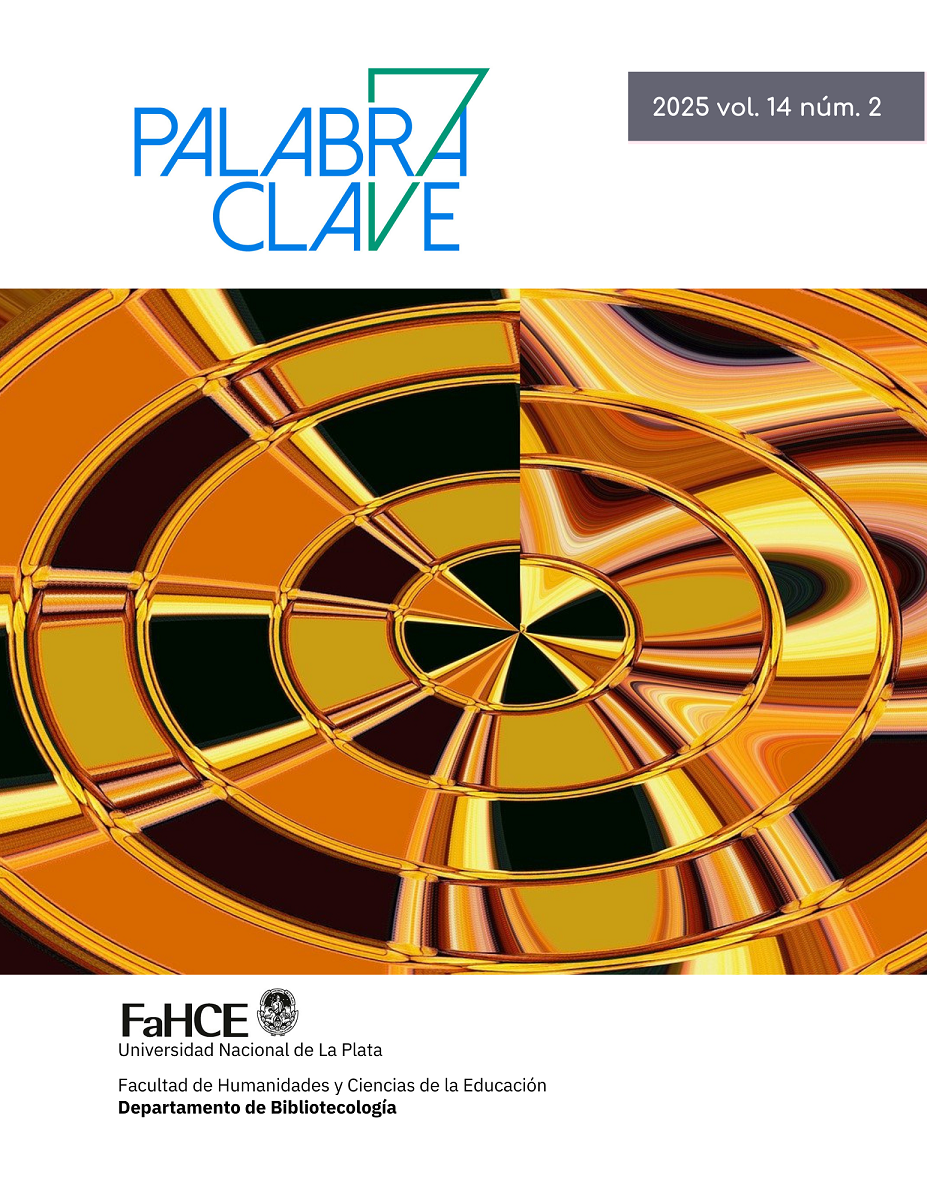Agenda 2030 and the social role of the university library: a reflection on information services in response to the diversity of quota students in higher education
Main Article Content
Abstract
The study delves into the evolving services of University Libraries to meet the diversity of the university community that enters higher education through the quota system, that is, through affirmative action policies within the context of the Sustainable Development Goals of the 2030 Agenda. To identify the information services tailored for students entering higher education via affirmative actions, contextualized within the Sustainable Development Goals of the 2030 Agenda. The research was based on a theoretical framework carried out in Information Science databases covering the literature from 2012 to 2023. Some actions are already being developed by libraries, reinforcing their pivotal social role. There are a variety of user groups served by inclusive information services. However, while some of these services are offered by non-academic libraries, the potential exists for adaptation and incorporation within the university library environments. Studies centered on affirmative actions within the scope of the inclusive university library, the Sustainable Development Goal and the 2030 Agenda are gaining traction. However, these three areas remain unexplored in the context of Information Science research, which is the main contribution of this article.
Downloads
Article Details

This work is licensed under a Creative Commons Attribution-NonCommercial-ShareAlike 4.0 International License.
References
Bawack, R. (2018). Academic libraries in Cameroon: achieving Agenda 2030 goals. International information and library review, 50(1), 63-66. https://doi.org/10.1080/10572317.2018.1439148 DOI: https://doi.org/10.1080/10572317.2018.1439148
Castro Filho, C. M. (2018). Agenda 2030 para o desenvolvimento sustentável: uma leitura de política pública na clave da biblioteca escolar. RDBCI, 16(3), 355-372. https://periodicos.sbu.unicamp.br/ojs/index.php/rdbci/article/view/8650931/pdf DOI: https://doi.org/10.20396/rdbci.v16i3.8650931
Chauí, M. (2001). Escritos sobre a universidade. UNESP. https://uspcaf.wordpress.com/wp-content/uploads/2011/11/escrito-sobre-a-universidade.pdf DOI: https://doi.org/10.7476/9788539303045
Chauí, M. (2003). A universidade pública sob nova perspectiva. Revista brasileira de educação, 1(24), 05-15. DOI: https://doi.org/10.1590/S1413-24782003000300002
Cysne, F. P. (1993). Biblioteconomia: dimensão social e educativa. EUFC.
Domingues, P. (2005). Ações afirmativas para negros no Brasil: o início de uma reparação histórica. Revista brasileira de educação, 29, 164-176. https://www.scielo.br/j/rbedu/a/g9K3wSLyhKn88LXn3GgJDvc/?format=pdf&lang=pt DOI: https://doi.org/10.1590/S1413-24782005000200013
Eugênio, J. E. S. (2011). Acessibilidade para estudantes com necessidades especiais: estudo de caso da Biblioteca Central Zila Mamede da Universidade Federal do Rio Grande do Norte (Graduação em Biblioteconomia). Universidade Federal do Rio Grande do Norte, Centro de Ciências Sociais Aplicadas, Natal.
Ferraz, M. N. (2014). O papel social das bibliotecas públicas no século XXI e o caso da Superintendência de Bibliotecas Públicas de Minas Gerais. Perspectivas em ciência da informação, 19(n.º esp.), 18-30. https://www.scielo.br/j/pci/a/h3kdkrxzgdBqk8cm9ZKtqhd/?format=pdf&lang=pt DOI: https://doi.org/10.1590/1981-5344/2280
Franco, I. M. (2018). Empreendedorismo e inovação: um novo perfil de bibliotecas. Em Anais do 5º Encontro Regional dos Estudantes de Biblioteconomia, Documentação, Gestão e Ciência da Informação das Regiões Sudeste, Centro Oeste e Sul, UFMG.
Gama, M. C. F. & Zaninelli, T. B. (2022). Inovação em bibliotecas no cenário internacional: foco na Agenda 2030. Perspectivas em gestão & conhecimento, 12(3), 266-280. https://periodicos.ufpb.br/index.php/pgc/article/view/65017/36743 DOI: https://doi.org/10.22478/ufpb.2236-417X.2022v12n3.65017
Gaspar, L. & Barbosa, V. (2013). Ações afirmativas e política de cotas no Brasil: uma bibliografia, 1999–2012. Ministério da Educação Fundação Joaquim Nabuco. https://www.gov.br/fundaj/pt-br/composicao/dimeca-1/biblioteca/acervos/inventarios-documentais-e-indices/acoes_afirmativas_e_politicas_de_cotas_brasil.pdf
Gomes, J. B. (2001). Ação afirmativa e princípio constitucional da igualdade: o direito como instrumento de transformação social. Renovar.
Oliveira, M. A. D. O., Alves, M. V. & Maia, M. A. Q. (2013). A função social do profissional da informação numa biblioteca inclusiva. In Anais do 25º Congresso Brasileiro de Biblioteconomia, Documentação e Ciência da Informação. UFSC, Florianópolis, Brasil. https://portal.febab.org.br/cbbd2019/article/view/1600
Mello, M. R. G. de, Martínez-Ávila, D., Araujo, L. M. & Valentim, M. L. P. (2020). Entre técnica e reflexão: um estudo da função social das bibliotecas públicas a partir da Teoria Crítica. Informação & informação, 25(4), 377-401. https://doi.org/10.5433/1981-8920.2020v25n4p377 DOI: https://doi.org/10.5433/1981-8920.2020v25n4p377
Pena, M. A. C., Matos, D. A. S. & Coutrim, R. M. E. (2020). Percurso de estudantes cotistas: ingresso, permanência e oportunidades no ensino superior. Avaliação: revista da avaliação da educação superior, 25(01), 25-51. DOI: https://doi.org/10.1590/s1414-40772020000100003
Pinheiro, A. V. (2011). Organização e administração de bibliotecas: planos de aula. Material didático de apoio à disciplina OAB, ministrada na Escola de Biblioteconomia da Universidade Federal do Estado do Rio de Janeiro.
Pupo, D. T., Melo, A. M. & Pérez Ferrés, S. P. (2008). Acessibilidade: discurso e prática no cotidiano das bibliotecas. Unicamp.
Ramírez Leyva, E. M. (Coord.). (2018). La biblioteca universitaria como espacio de formación de lectores. UNAM.
Ribeiro, A. & Leite, J. (2002). Contributos para um conceito de “biblioteca inclusiva”. Integrar, 19, 50-56. https://repositorio-aberto.up.pt/bitstream/10216/18473/2/73257.pdf
Sá, R. N. A. & Salazar, L. B. (2020). Inclusão de alunos com necessidades educativas especiais: um estudo descritivo a partir dos relatos dos estudantes. Revista científica multidisciplinar Núcleo de Conhecimento, 11(1), 153-167. https://www.nucleodoconhecimento.com.br/wp-content/uploads/2020/11/necessidades-educativas-especiais.pdf DOI: https://doi.org/10.32749/nucleodoconhecimento.com.br/educacao/necessidades-educativas-especiais
Sala, F., Lopes, F. C., Sanches, G. A. R. & Brito, T. R. (2020). Bibliotecas universitárias em um cenário de crise: mediação da informação por meio das redes sociais durante a pandemia de COVID-19. Informação em pauta, 5(1), 10-32. http://periodicos.ufc.br/informacaoempauta/article/view/43933/161680
Santa Anna, J. & Costa, M. E. O. (2017). A redefinição da biblioteca universitária à luz dos paradigmas da Biblioteconomia e Ciência da Informação: um estudo de caso. Ciência da informação em revista, 4(3), 40-57. https://brapci.inf.br/index.php/res/v/36355 DOI: https://doi.org/10.28998/cirev.2017v4n3d
Silva, F. S. & Borges, J. (2021). A biblioteca pública como viabilizadora da Agenda 2030 da ONU. Revista brasileira de biblioteconomia e documentação, 17, 1-23. https://brapci.inf.br/index.php/res/download/166377
Stroparo, M. E. & Moreira, L. C. (2016). O papel da biblioteca universitária na inclusão de alunos com deficiência no ensino superior. Educação,41(1), 209-222. https://periodicos.ufsm.br/reveducacao/article/view/17430 DOI: https://doi.org/10.5902/1984644417430
Universidade Federal do Rio Grande do Sul FURGS (2020). Entrevista com Celvio Derbi Casal.Projeto biblioteca viva: laboratório de criatividade. Farol podcast. https://www.ufrgs.br/luminapodcasts/site/episodio/biblioteca-viva-bibliotecas-como-espaco-da-producao-do-comum
Zaninelli, T. B., Caldeira, G., & Fonseca, D. L. S. (2022). Veteranos, baby boomers, nativos digitais, gerações x, y e z, geração polegar e geração alfa: perfil geracional dos atuais e potenciais usuários das bibliotecas universitárias. Brazilian journal of information studies: research trends, 16, e02143. https://revistas.marilia.unesp.br/index.php/bjis/article/view/12991/8744 DOI: https://doi.org/10.36311/1981-1640.2022.v16.e02143
